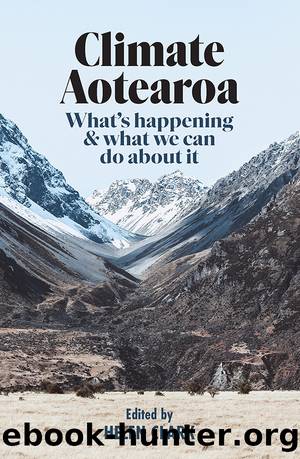Climate Aotearoa by Clark Helen

Author:Clark, Helen [Helen Clark]
Language: eng
Format: epub
Publisher: Allen & Unwin
Published: 2021-02-19T00:00:00+00:00
DIET AND FOOD SYSTEMS
Globally, food systems are a significant source of greenhouse gas emissions, as well as being a major contributor to a range of adverse health outcomes (Swinburn et al., 2019). The rise of intensive and exploitative agricultural practices has seen emissions from food production and land use change (e.g. clearing forests for farmland) increasing worldwide in recent decades. This has been associated with a shift from traditional diets to more processed foods and animal-based products. These dietary trends increase the risk of type 2 diabetes, coronary heart disease, some cancers, and other chronic diseases, with overwhelmingly negative impacts on population health (Tilman & Clark, 2014).
There is strong evidence that plant-based diets can contribute to better nutritional and health outcomes as well as significantly reducing the climate impacts of food systems. For example, it has been estimated that replacing animal sources with plant-based foods in high-income countries could reduce premature mortality by up to 12 per cent and cut greenhouse gas emissions by up to 84 per cent (Springmann et al., 2018). Experts have called for an urgent transformation of our food systems in order to address the inter-related environmental and health crises (Willett et al., 2019).
These challenges and opportunities are particularly acute in Aotearoa New Zealand. Dietary risk factors are responsible for more than 10 per cent of the overall burden of disease (MOH, 2013), and these adverse impacts fall disproportionately on MÄori and Pacific populations (MOH, 2018). In terms of the food systemâs contribution to climate change, agriculture is responsible for 48 per cent of New Zealandâs total emissions. Methane from dairy cattle digestive systems has been a major contributor to the increase in our emissions from 1990 to 2018 (MFE, 2020). Agriculture also has broader environmental and health impacts, for example reduction in water quality in rivers (Julian et al., 2017), loss of freshwater biodiversity (Joy et al., 2018) and contamination of drinking water sources (Phiri et al., 2020) leading to increased risk of waterborne diseases.
The good news is that transformation of our agricultural and food systems, together with the associated changes to New Zealandersâ diets, can help to tackle all these problems simultaneously. A shift away from animal-based foods, particularly red and processed meats, towards diets rich in whole plant foods (e.g. vegetables, fruits, legumes and whole grains) can bring about substantial benefits for climate and health (Drew et al., 2020).
Download
This site does not store any files on its server. We only index and link to content provided by other sites. Please contact the content providers to delete copyright contents if any and email us, we'll remove relevant links or contents immediately.
Man-made Catastrophes and Risk Information Concealment by Dmitry Chernov & Didier Sornette(5981)
The Revenge of Geography: What the Map Tells Us About Coming Conflicts and the Battle Against Fate by Kaplan Robert D(4062)
Zero Waste Home by Bea Johnson(3822)
COSMOS by Carl Sagan(3609)
Good by S. Walden(3535)
In a Sunburned Country by Bill Bryson(3524)
The Fate of Rome: Climate, Disease, and the End of an Empire (The Princeton History of the Ancient World) by Kyle Harper(3046)
A Wilder Time by William E. Glassley(2848)
Camino Island by John Grisham(2787)
Organic Mushroom Farming and Mycoremediation by Tradd Cotter(2680)
The Ogre by Doug Scott(2670)
Human Dynamics Research in Smart and Connected Communities by Shih-Lung Shaw & Daniel Sui(2490)
Energy Myths and Realities by Vaclav Smil(2478)
The Traveler's Gift by Andy Andrews(2445)
9781803241661-PYTHON FOR ARCGIS PRO by Unknown(2354)
Inside the Middle East by Avi Melamed(2345)
Birds of New Guinea by Pratt Thane K.; Beehler Bruce M.; Anderton John C(2244)
A History of Warfare by John Keegan(2227)
And the Band Played On by Randy Shilts(2179)
